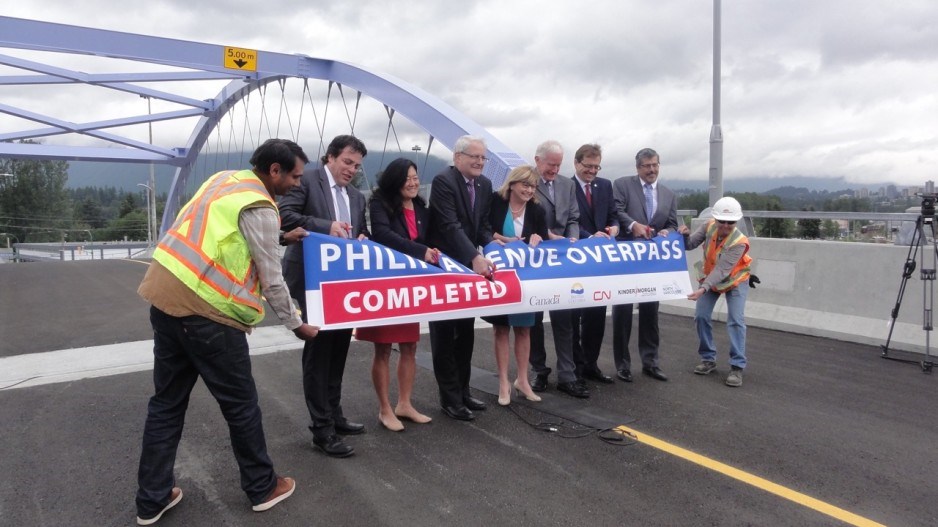The completion schedule and cost of a new two-lane bridge over CN (TSX:CNR) railway tracks to Kinder Morgan’s (NYSE:KMI) North Vancouver terminal was a point of confusion among two of the project funders on July 5.
The Philip Avenue overpass, which opens to traffic today (July 6), was celebrated with the cutting of a banner that read “Completed,” instead of on time, on budget.
A nearby sign, at West First Avenue and Pemberton Avenue, was removed last month. It showed the logos of the funding partners – the federal, British Columbia and North Vancouver District governments and CN and Kinder Morgan – under the slogan “Improving safety, reducing congestion, noise and idling” and the “Summer 2014-Fall 2015” timeline.
“We all did work together so well to do this project,” beamed B.C. Emergency Preparedness Minister of State Naomi Yamamoto, who subbed in for Transportation Minister Todd Stone at the ceremony. “This project is coming in several million dollars, I don’t have the exact figure, but several million dollars under budget. That’s excellent news.”
The project was announced as “underway” in a federal government news release on October 17, 2014. According to that announcement, “the total cost of the project is estimated at over $30 million” and “construction of the Philip Avenue Overpass is expected to be completed in the fall of 2015.”
Asked by Business in Vancouver about the apparent seven-to-nine month delay to summer 2016, Yamamoto said “I have no idea about what the timetables were.”
As for the cost, a B.C. government news release published to coincide with the July 5 event repeated the line from the 2014 federal news release: “The total cost of the project is estimated at over $30 million.”
North Vancouver District Mayor Richard Walton, however, said the project would come in at $27.5 million.
“As we own it ultimately, if there were any overruns we would have been responsible to the funding partners for that,” Walton said. “The bill came in less. That doesn’t happen often enough.”
Under the funding formula, Ottawa committed up to $13.4 million, B.C. $10.1 million, CN $4.2 million, Kinder Morgan $2.1 million and the District of North Vancouver $300,000. Walton said little of the built-in contingency was used, but he could not explain the apparent delay.
“There weren’t really any delays. I’m not sure where that sign came from,” Walton said.
By comparison, the four-lane, $50 million Powell Street Overpass in Vancouver was built between June 2013 and July 2014.
The BC Liberal government often announces that big-ticket public infrastructure projects are on time and on budget, but the opposite is true. In late April, Peter Fassbender, the minister responsible for TransLink, claimed the $1.43 billion Evergreen Line was “going to be on time and on budget.” The opening of the SkyTrain extension has been delayed twice to early 2017, and the government is in mediation with contractor SNC-Lavalin (TSX:SNC) over its tunnelling cost overruns.
The South Fraser Perimeter Road ($1 billion to $1.264 billion), Vancouver Convention Centre expansion ($495 million to $841 million) and BC Place Stadium renovation ($365 million to $514 million) are a few of the other high-profile projects with time and budget challenges.
“They’re having fun with figures,” said NDP transportation critic Claire Trevena. “They go off into the election campaign and say we’re going to be debt free. What do they do? They rack up the debt, don’t stay on time for small projects and hope they can pull the wool over peoples’ eyes.”
Immediately to the east of the new North Vancouver bridge, a Metro Vancouver mega-project is planned to take shape between 2017 and 2020. A design/build/finance deal is expected by the end of the year to build the $700 million Lions Gate Secondary Wastewater Treatment Plant.
Walton said the scheduled 2021 decommissioning of the existing plant west of the Lions Gate Bridge could reopen the possibility of extending West First Avenue to Park Royal, depending on Squamish Nation development plans by the shopping centre.




